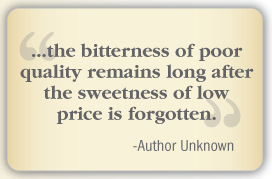Poor Quality Translation Costs More In the End
Medical Pharmaceutical Translations • Nov 21, 2016 12:00:00 AM

“The bitterness of poor quality remains long after the sweetness of low price is forgotten.” When it comes to translation there is no better quote. Low price translation pales in comparison to top-notch translators working tirelessly to transform your documents into works of art in another language. Humans will always outperform no-price machine translation as well. Essential to successful communication in other languages, translation is your key to unlocking the rest of the world. Choosing a quality translation should never be based solely on price; it should include value as well. But what are you paying for when you buy translation? What influences translation pricing and why does it cost so much? Let’s break it down:
On average, professional translators translate about 2,500 words per day and some even offer unbelievably low rates. Any translators who offer low-ball quotes have reasons for doing so. It’s possible they are not native speakers or they may be using machine translation without letting on. When it comes to paying more for translation, you do get what you pay for and yet, the translators aren’t skipping gleefully to the bank with their checks when finished translating for you. Factoring in editorial and project management costs, any translation company markups, possible currency fluctuations, any international payments, and a modest operating income, and you will see that quality translators are not getting paid exorbitantly high incomes after all.
While it may be expensive, there are ways to manage translation costs to make them more budget friendly:
Translate less. The number one reason costs skyrocket is due to the volume of content that needs to be translated. Utilizing repetitive text helps reduce cost, as does reusing previously translated material. When updating previous versions, be sure to avoid unnecessary changes or edits.
Take your time. Keep the typical 2,500 words per in mind when trying to gage the time in which you can reasonably receive your translation. A 12,000 word document will not be done in three days. And if it is, it will either be poor quality or cost upwards of 25% more for the trouble.
Remember difficult means pricier. Translating scientific names and detailed Standard Operating Procedures is more difficult, and thus costlier, than translation of websites or labels.
Use subject-specific translators. Translators with knowledge of industry jargon, technical wording, and the like may cost more in the beginning, but they are worth it. They help you avoid having to correct and rework poor translations later on.
Use technology wisely. Avoid free automatic translation for all but a few simple words. Human translators sometimes do use more advanced machine translations, but never without human editors reviewing every word.
Be mindful of where your translator resides. A translator who lives in Armenia will cost less than one in New York City. When choosing one in another part of the world, be sure they adhere to the top things all quality translators should be. Make sure they answer these questions adequately: Are they good listeners? Do they understand your needs and wants? Are they reliable and responsive? Can they maintain confidentiality? Are the deliverables all you wanted?
While you should never pay more than you should, when it comes to your brand and your company, paying for translation makes sense. And it will be less expensive than any legal fees you may get stuck paying if your poor quality translations injures someone, for example. Avoid this bitterness at all costs.
by Ilona Knudson
#qualitytranslation #translations #translationcost #lostintranslation #aiatranslations #poortranslation
